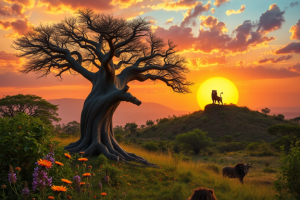
Earlier in the 20th century, and more particularly in the 1960s and 1970s, discussions and debates on African philosophy centered around the question whether Africa has a philosophy worthy or the term. According to many Western «experts» on philosophy Africa has no philosophy of its own in the modern sense but different belief systems and religions that could hardly be called philosophies. The first man who came up with the assertion that Africa had indeed a philosophy worthy of our attention was called Placid Temples, a missionary from Belgium, who made it clear in his book «Bantu Philosophy» (1945).
According to this book, the world views of Africans could be articulated as philosophy although they do not do so directly or in a systematic way. Placid Temples, the author of the book was a Belgian missionary who lived among the Bantu people of Central Africa where Belgians had set foot to establish their colonial rule.
Father Temple›s «Bantu Philosophy» (‹La Philosophie Bantou› in French), maintains that, «The Bantu peoples of Sub-Saharan Africa have an implicit philosophy» adding that according to this philosophy, «beings are differentiated in their essence or nature. They hold that there is the divine force, celestial or terrestrial forces, and animal forces or mineral forces.» Before Temples came up with his book, the term Bantu referred to «research done on traditional culture between 1950 and 1990 in Central Africa and more specifically in The Democratic Republic of Congo, Rwanda and Uganda.»
It was said that, the Bantu people originally believed all things in nature had souls or spirits including animals, plants, and inanimate things as well had souls or spirits. This belief is known as animism. Although Bantu philosophy is broader in perspective and holistic in its approach, there is what is called the Bantu Ntu element which is found in many African languages. This is considered to be the Vital force or as Temples called it the Bantu Ontology. «In short Ntu means a human being and it emphasizes that there is a spirit of oneness and harmony among people and nature. The concept of Ntu emphasizes solidarity and oneness amongst Africans.»
The appearance of the book, i.e. «Bantu Philosophy» had triggered fierce debates among mainstream philosophy groups in Europe and elsewhere, particularly among those who believed until recently that African philosophy was a fiction concocted by the same Belgian missionary. However, subsequent studies both by philosophers in the West as well as within Africa have proved beyond a grain of doubt that Africa was indeed a land of ancient philosophy or world outlook although this philosophy might not have been as articulate as the modern philosophy in Western cultures.
Studies have even established who the first African philosopher was. According to some of them, «From 2200 to 1000 BCE, one of the earliest known African philosophers was a man called Ptahhotep, an ancient Egyptian philosopher.» According to Wikipedia, «African philosophy is the philosophical discourse produced in Africa or by indigenous Africans. African philosophers are found in the various academic fields of present philosophy such as metaphysics, epistemology, moral philosophy and public philosophy.»
Other studies by researchers like the Canadian Jesuit philosopher Claude Sumner, who lived in Ethiopia for most of his long life, had established incontrovertible proof about the existence of African or African philosophy long before the Western world developed its own philosophy, that is mainly derived from the Greeks and the Romans who had closer contacts with Africans, i.e. Egyptians, before it found its own philosophical identity.
Many African philosophers who studied in Europe or America have also developed the nature and shape of African philosophy both as the sum total of the philosophy of African peoples by studying the Yoruba culture and philosophy in Nigeria, and the Ethiopian philosophy of man thus called by Professor Sumner because Ethiopian philosophy put man at the centre of its metaphysical investigations or thoughts. Professor Sumner thus put Ethiopian philosopher›s Zara Yacob, an Axumite monk, on a par with the philosopher of French metaphysical thinker Rene Descartes who invented the philosophy of European rationalism summarized in the famous dictum, «Je pense, donc Je suis» (I think, therefore I am) had become popular beyond Europe.
African philosophy is sometimes called «ethno-philosophy» by some students of the tradition to indicate that, African philosophy developed along a different line from European philosophical traditions because culture plays a big role in its emergence and growth. African philosophy is not speculative and, «One of the implicit assumptions of ethno-philosophy is that a specific culture can have a philosophy that is not applicable or accessible to all peoples and cultures in the world.
Thus, African philosophy is basically culture-sensitive in its approach and is also time-specific or culture-sensitive both at the same time. That is why Western philosophers in the classic traditions of Hegel or Aristotle sometimes maintain that their philosophy has always been universally valid while ethno-philosophy that cannot overcome the boundaries of ethnicity and history in its investigations is therefore confined only to Africa.
Subsequent investigations however came up with opposing arguments that African philosophy should not be narrowly defined. One of the protagonists this view says that, «the ethno-philosophical approach should not at face value or as a sole determinant in a static form. «Research on Ubuntu which is another alternative to ethno-philosophy, and a collective discourse on African philosophy that takes differences, historical developments and social contexts seriously.»
Culture, like art, justice, right or aesthetic, has its own philosophy and African art is particularly different from other arts because it often combines art with ideologies or world views and philosophies. Art in Africa is not a pursuit that is separate from consciousness, spirit or mental attitudes or ideologies as it is in other countries in Europe or the West on general. For Africans, material conditions of life are woven into the fabrics of their communal values systems and consciousness of the world around them or outside of them.
In its modern sense, ideology is sometimes defined as a «false consciousness» or a reflection of the material conditions in general. This is not so in Africa where production of the means of survival is impacted by the mental conditions of the people or their conceptions of nature and society. For this reason, African art and culture tends to be mire humane because it is less material. Western art is more material oriented while African art and culture is more human oriented.
In this see the African philosophy of art is different and opposed to the Western notion of art or philosophy of art. African philosophy of art is culture specific and does not pretend to be universal as Western philosophy of art pretends to be. From Hegel to Marx and to contemporary Western philosophers, the philosophy of art is tied to the level of economic and material development of society. In their views, Africa has no philosophy worth talking about and secondly if it has one, it is still in the state of nature and not based on advanced material conditions.
They often forget that the philosophy of art of the Chinese is different from that of the Africans which is again different from the Europeans and that they evolve according to their specific social, historical and spiritual dynamics instead of mimic a certain model. African philosophy is man-oriented not in the Western sense of Absolute Spirit but in the African sense of human spirit.
Africa may be materially undeveloped but it has evolved powerful artistic forms based on the priority of human spiritual needs that are supreme aspects of their existence as expressed through the tales or stories, their masks and architectures, pictures and other art forms. Western philosophy of art looks backwards at the as it is stuck to the Hegelian problematic of the Absolute Spirit while its African counterpart is forward looking dealing both with the present and the future.
«African art is also connected to African philosophy through its use of storytelling. Many African artworks, such as masks, sculptures and textiles, and stories about the history, myths and beliefs of African cultures are but to mention a few. These stories out of the past bear not just about the past but are also relevant to the future.» African art is therefore more progressive than its western counterpart that emphasis on art forms than the con tent and purpose of art which in the African case is the improvement of the spiritual life of the individual and not on mass consumption of art as a product of the market.
Western art has progressively lost its humanity through a long history of market development and the valuation of the products of the human spirit. African art is fresher, potentially more creative and with a glorious past which has become the envy of the art and culture industries in the West that are keen on appropriating and valuating African art works that were created for the purpose of satisfying the human quest for expression and the search for the meaning of life. In Western traditions, the market is the authority of this valuation process while African art is valueless because it was created for spiritual expression of man and not to satisfy the material cravings of the Western man.
The valuation and exchange value of the products of African arts is an irresponsible and inhumane activity that is out to destroy the African heritage by condemning it to constant valuation and revaluation in the hands of the black market and the criminal cultural underworld. It may be now the right time to rise to the occasion and fight to save African art, and together with it African philosophy of art, from speculators and their market associates.
BY MULUGETA GUDETA
The Ethiopian Herald November 26/2023





